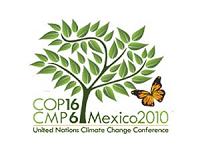| . |  |
. |
Cancun, Mexico (AFP) Dec 8, 2010 Haunted by the criticism it endured after the Copenhagen climate summit, China has launched an image makeover as it recasts itself as a team player in global talks, observers say. In the latest UN-led talks underway in Mexico, China's negotiators have cast aside a sometimes shrill past approach and repeatedly said they seek a compromise, including on Beijing's past refusal on outside verification of its climate efforts. The shift extends to public diplomacy, with China setting up a prominent pavilion in the heart of Cancun city and distributing glossy magazines to delegates' hotels highlighting action by the world's largest carbon emitter. "We are seeing a significant change in negotiation strategy by China here in Cancun," said Ailun Yang of environmental group Greenpeace's China branch. "It is encouraging to see that China is focusing on what you can offer instead of just responding to provocations from other countries." The turnaround may be more a matter of appearances, as negotiators said China was still holding out on a deal over verification after a compromise led by India. But the atmosphere is palpably different than in Copenhagen, attended by more than 100 heads of state, including US President Barack Obama and Chinese Premier Wen Jiabao. Participants said China put its foot down against any hint of subjecting itself to international requirements. "I think China is sensitive to the criticism that they got, whether that criticism is justified or not," said Duncan Marsh, director of international climate policy for The Nature Conservancy. "I also think, however, that they are acting from a position of greater confidence. China is doing a lot in terms of domestic action to control greenhouse gas emissions and they know they are a world leader in many of their initiatives." Faced with severe pollution and a predicted surge in urbanization, China has inscribed plans to reduce carbon emissions in its last five-year plan. The Asian giant is building the world's largest high-speed rail network and has aggressively pursued research on cleaner coal and vehicles. "I don't think that an international agreement or pressure is the dominant factor for China to take action. It is in China's own interest," said Zou Ji, a professor of environmental economics at Renmin University and China country director for the World Resources Institute. Zou said China had a choice between developing like the United States, where the average person produces about 20 tonnes of carbon each year, or like Japan and the European Union, where output is half as much. "Today, many young Chinese consumers share the so-called American dream. They want a very big house and an SUV. But we should avoid that," he said. "The environment cannot take that. China has 20 percent of the world's population." But some negotiation watchers said they also felt a political dynamic at play, with China seeking to smooth out relations with the United States that have been rocky on issues ranging from trade to human rights. US President Barack Obama's administration came into office pledging that climate would be one area on which the world's largest developed and developing countries could work together. "I think China felt stung at Copenhagen after so much of the finger-pointing," said Barbara Finamore, director of the China program at the US-based Natural Resources Defense Council. "I think China has indeed learned from that and clearly made a concerted effort at the highest levels to turn the tide and take a very positive and constructive attitude" on climate, she added. Before Copenhagen, the United States was usually on the receiving end of criticism at climate talks as former president George W. Bush was a staunch opponent of the Kyoto Protocol. While the Cancun talks have been striking for their amity, the spotlight now may have turned to another country -- Japan. The Japanese bluntly rejected an extension of the Kyoto Protocol, saying the treaty is unfair by not including the United States and China.
Share This Article With Planet Earth
Related Links Climate Science News - Modeling, Mitigation Adaptation
 Upbeat UN climate talks work on hiccups
Upbeat UN climate talks work on hiccupsCancun, Mexico (AFP) Dec 8, 2010 The world's climate negotiators worked Wednesday to turn a growing consensus into concrete progress as talks in Mexico made headway on a range of issues including aid for the poorest countries. One year after the Copenhagen climate summit ended in widespread disappointment, the United Nations and host Mexico have tried to keep hopes in check by concentrating only on building blocks to a futu ... read more |
|
| The content herein, unless otherwise known to be public domain, are Copyright 1995-2010 - SpaceDaily. AFP and UPI Wire Stories are copyright Agence France-Presse and United Press International. ESA Portal Reports are copyright European Space Agency. All NASA sourced material is public domain. Additional copyrights may apply in whole or part to other bona fide parties. Advertising does not imply endorsement,agreement or approval of any opinions, statements or information provided by SpaceDaily on any Web page published or hosted by SpaceDaily. Privacy Statement |